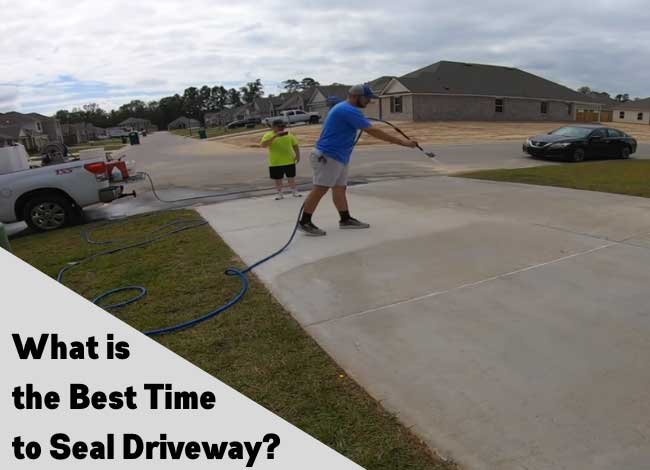Last Updated on May 12, 2025
Sealing your driveway with the best driveway sealer is not only a cost-effective way to protect your investment but also a smart strategy to extend its lifespan. Since asphalt surfaces are especially prone to cracking, oxidation, and wear from UV rays, moisture, chemicals, and vehicle traffic, sealing helps preserve their durability and appearance.
However, timing is critical. Sealing your driveway at the wrong time can compromise the effectiveness of the sealer, while doing it at the right time ensures optimal adhesion, proper curing, and long-lasting results.
When sealed correctly and at the right time, your driveway can resist damage from water, oil, salt, sunlight, and oxygen, minimizing the risk of cracks and potholes. Best of all, with quality sealant, you may only need to reseal your driveway every 2 to 5 years.
What Is the Best Time to Seal Your Driveway?
The ideal time to seal your driveway is during mild, dry weather—typically between May and October, depending on your location. During this window, temperatures are warm enough to allow proper curing, but not so hot that it causes the sealer to dry too quickly.
If you live in warmer states like California, Florida, Texas, Georgia, or South Carolina, you may have more flexibility and can seal your driveway almost year-round, provided the weather is dry and rain-free.
Related article: Follow these easy steps to remove asphalt sealer from concrete
However, residents in colder climates—such as Minnesota, Vermont, North Dakota, Montana, Maine, or Wyoming—should aim to seal their driveways in late spring through early fall when temperatures are more favorable.
🔍 Pro Tip: Always check the weather forecast and ensure no rain is expected for at least 48 to 72 hours after applying the sealant.
Why May to October Is the Best Window for Driveway Sealing
May through October offers the most consistent and favorable weather conditions for sealing. You won’t have to worry about moss growing on the driveway, as sealing it during the warm season helps prevent moisture buildup that encourages moss growth. Here’s why this period is ideal:
- Warm Days & Cool Nights: The temperature difference between day and night during May and June is ideal. It helps the sealer cure evenly without rapid drying or prolonged tackiness.
- Low Humidity: Lower humidity in spring and early summer supports better drying. High humidity slows the curing process and may leave the sealer soft or uneven.
- Less Debris: Unlike fall, when leaves and wind-blown debris are common, late spring and early summer offer a cleaner environment for sealing.
🛑 Caution: Avoid sealing during extreme heat or heavy summer rainfall, as both can negatively impact the drying process. Similarly, early spring may be too cold for proper curing, especially if nighttime temperatures dip below 50°F.
It’s important to consider the time to dry the driveway sealer, especially when sealing during cooler months or in high humidity, as this can impact the overall effectiveness and finish.
Why Fall May Be Less Ideal
While early fall is still acceptable for sealing in some regions, it comes with challenges:
- Cooler Nights: Longer curing times due to cooler temperatures can delay the sealing process.
- Debris in the Air: Falling leaves, dust, and wind-blown particles can land on the wet sealant, affecting the final finish.
- Reduced Sunlight: Shorter days mean less UV exposure, which can slow the curing process even further.
✅ What Conditions Are Ideal for Sealing a Driveway?
For the best results, your driveway should be sealed under optimal weather conditions. It’s not just about having warm weather—the temperature must also be within a specific range to allow proper curing and long-term durability of the sealer.
👉 Ideal temperature range: Between 50°F and 90°F
Most professionals recommend sealing your driveway when the temperature is around 65°F, which offers the perfect balance for curing. If the temperature rises above 95°F, the sealer may dry too quickly, resulting in an uneven surface or cracking.
Additionally, it’s wise to use high-quality sealers—for example, the Bone Dry concrete sealer, which is non-toxic and offers a fast drying time.
Drying Time Guidelines:
- Wait at least 8 hours before walking on the sealed surface.
- Allow a full 24 hours before allowing vehicle traffic.
- In shaded or high-humidity areas, allow up to 48 hours for optimal curing.
🛡️ Why Is It Important to Seal Your Driveway?
Sealing your driveway is more than just a cosmetic upgrade—it plays a vital role in protecting your asphalt or concrete surface from damage caused by:
- Sunlight (UV rays)
- Water infiltration
- Oil and chemical stains
- Freeze-thaw cycles
- General wear and tear
It also helps to seal small cracks, preventing them from expanding into larger potholes. A properly sealed driveway not only extends the life of your surface but also enhances curb appeal, making your home look well-maintained and polished. Moreover, applying an asphalt driveway sealer enhances your home’s curb appeal by giving the surface a cleaner, more polished appearance compared to an unsealed driveway.
❄️ Why Should You Avoid Sealing in Cold Weather?
One of the biggest mistakes homeowners make is trying to seal coat their driveways in cold conditions. When the temperature drops below 50°F, the sealer may not bond properly to the surface. This leads to:
- Premature cracking
- Fading
- Poor surface adhesion
- Reduced durability
- Possible pothole formation
Important Tip: Avoid sealing if rain is in the forecast, even after application. The driveway should stay dry for at least 24–48 hours post-sealing.
Related article: How to apply driveway sealer on your driveway?
Therefore, always check the weather forecast carefully before seal coating your asphalt driveway to ensure optimal results and avoid unexpected rain.
📌 Summary: Best Time to Seal Your Driveway
Timing your sealing project correctly can make a world of difference in the performance and longevity of your driveway. For the best results, aim to seal your driveway during May through June or within the broader window of May to October, depending on your climate. When sealed properly and in the right conditions, your asphalt driveway will resist cracks, look great, and remain protected for years to come.
To get the most from your sealant, always choose the right time and conditions:
- Best temperature range: 50°F to 90°F
- Avoid sealing during rainy or freezing weather
- Best months: May through October
- Drying time: 8 hours (foot traffic), 24–48 hours (vehicle traffic)
- Use high-quality, weather-resistant sealers for better protection and longevity
If you live in cold regions, wait for summer. If you’re in a hot state, avoid peak heat above 95°F. When done properly, sealing your driveway will extend its life, maintain its appearance, and save you from costly repairs. Additionally, choose a high-quality, rust-resistant seal coating product to ensure long-lasting protection and superior results.

